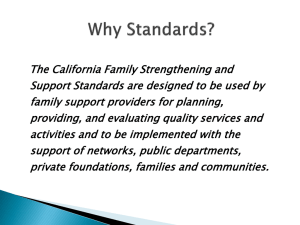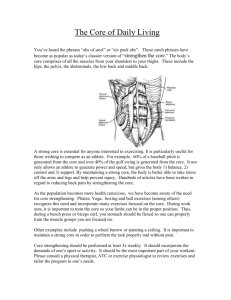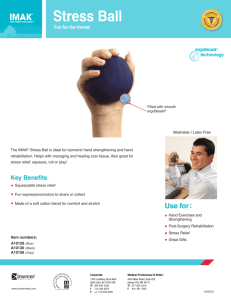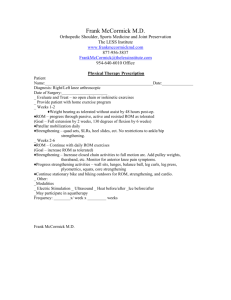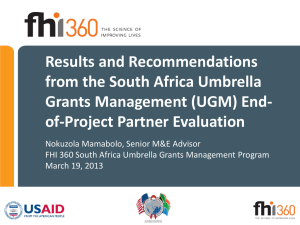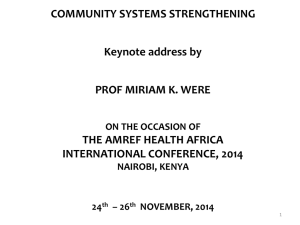Strengthening Families Program: For Parents and Youth 10
advertisement
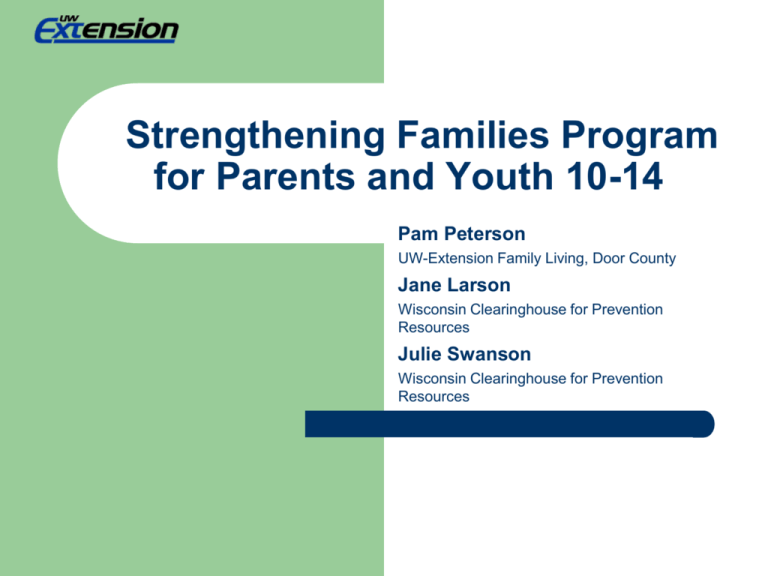
Strengthening Families Program for Parents and Youth 10-14 Pam Peterson UW-Extension Family Living, Door County Jane Larson Wisconsin Clearinghouse for Prevention Resources Julie Swanson Wisconsin Clearinghouse for Prevention Resources UW-Extension Mission Bringing university research to the people of Wisconsin Tobacco Control Resource Center for Wisconsin State Prevention Resource Center (DHFS/CYF) Regional Centers Collaborative * AHEC * CESA 5 * Fighting Back * Northwoods (DPH) Wisconsin Clearinghouse for Prevention Resources State Regional Alcohol & Drug Awareness Resource (RADAR) Network Center (DHFS/MHSAS) Wisconsin State Prevention Conference Wisconsin Afterschool Network Evidence-Based Programs and Practices Research has demonstrated that specific approaches and strategies can reduce problem behaviors & enhance positive developmental outcomes The most effective programs and practices are termed “evidence-based” What makes a program evidence-based? • • • • • Based on a solid scientific theoretical foundation Carefully implemented and evaluated using rigorous scientific methods Replicated and evaluated in a variety of settings with a range of audiences Evaluation findings have been subjected to critical review and published in respected scientific journals “Certified” as evidence-based by a federal agency or respected research organization Strengthening Families Program: For Parents and Youth 10-14 Recognized as exemplary and evidenced based by the following agencies: • 4-H Program of Distinction • Blueprints for Violence Prevention • Center for Substance Abuse Prevention • National Institute on Drug Abuse • Office of Juvenile Justice and Delinquency Prevention • Substance Abuse in Mental Health Services • Administration US Department of Education Strengthening Families Program: For Parents and Youth 10-14 A parent, youth, and family skills-building curriculum designed to: • Prevent teen substance abuse and other behavior problems • Strengthen parenting skills • Build family strengths Strengthening Families Program for Parents and Youth 10-14 Special Features of the Program – – – – – – – – Timing: the transition to the teen years Parents and youth learn together Videos portray parent-child interaction User friendly materials Fun, interactive projects and activities Families eat meal together Child care provided Rigorously evaluated Strengthening Families Program for Parents and Youth 10-14 Program Format – – – – Developed for parents and youth 10-14 Designed for 7-10 families per series Seven two-hour sessions with graduation Four booster sessions to be held 3-12 months later Typical SFP Session Family Meal 1 Hour Simultaneously + 1 Hour Parent Session Youth Session Family Session Strengthening Families Program for Parents and Youth 10-14 First Hour: Parent group – Video based Strengthening Families Program for Parents and Youth 10-14 First Hour: Youth group Strengthening Families Program for Parents and Youth 10-14 Second Hour: Parents and youth together Family Needs Strengthening Families Program Skill Building Strengthening Families Program for Parents and Youth 10-14 Program Activities • Short lectures • Videos • Discussions • Skills practice • Learning games • Family projects Strengthening Families Program for Parents and Youth 10-14 Core Themes • Using Love and Limits • Empathy, Parent → Youth, Youth → Parent • Rules/Responsibilities to Reach Goals • Expressing Appreciation to Family Members • Open and Clear Communication • Protecting against Substance Abuse Strengthening Families Program for Parents and Youth 10-14 Program Materials • • • • • 415–page leader guide with masters for handouts 215–page leader guide with masters for Booster Sessions 1-4 11 DVDs -Present information and illustrate skills -Actors reflect multi-cultural heritage/ethnicity -6 Parent DVDs -1 youth DVD for 2 sessions -2 family DVDs Love and Limits magnets (optional) Poster Set (optional) Strengthening Families Program for Parents and Youth 10-14 SESSION ONE Parent Session: Showing love and setting limits Supporting youths’ dreams and goals Youth Session: Goal setting Family Session: Connecting as a family Strengthening Families Program for Parents and Youth 10-14 SESSION TWO Parent Session: What youth this age are like Need for house rules Communication through “I” statements Youth Session: What’s good and what’s hard about being a youth or a parent Why parents are stressed Gifts Family Session: Make a family tree together Strengthening Families Program for Parents and Youth 10-14 SESSION THREE Parent Session: Watching for good things youth do Learning a point chart for behavior Youth Session: Understanding stress Family Session: Family meetings Strengthening Families Program for Parents and Youth 10-14 SESSION FOUR Parent Session: Giving small consequences and staying calm Big penalties for big problems Youth Session: Everyone has rules and responsibilities Things go better if rules are followed Family Session: Understanding what family values are Strengthening Families Program for Parents and Youth 10-14 SESSION FIVE Parent Session: Learning to listen to problems Listening for feelings Meeting basic needs Youth Session: Keeping out of trouble with friends Drugs and alcohol hurt Practice skills for resisting peer pressure Family Session: Practicing listening to each other Joint problem solving Strengthening Families Program for Parents and Youth 10-14 SESSION SIX Parent Session: Protecting against alcohol, tobacco and drug abuse in youth Risk and protective factors Supporting youth in school Monitoring youth Youth Session: Dealing with peer pressure and friends What good friends are like Family Session: Reaching goals Parents helping youth with peer pressure Sharing refusal skills Sharing of parental dreams and expectations Strengthening Families Program for Parents and Youth 10-14 SESSION SEVEN Parent Session: Stress and family needs Getting families the help they might need Using community resources Youth Session: Service to others Interacting with positive older teen role models Family Session: Celebration and review Letters to one another Graduation Strengthening Families Program for Parents and Youth 10-14 Youth Risk Factors – – – – – Aggressive or withdrawn behavior Negative peer influence Poor school performance Lack of prosocial goals Poor relationship with parents Youth Protective Factors – – – – – Positive future orientation Peer pressure resistance skills Prosocial peer relationships Positive management of emotions Empathy with parents Strengthening Families Program for Parents and Youth 10-14 Parental Risk Factors – – – – Demanding and rejecting behavior Poor child management Harsh and inappropriate discipline Poor communication of family rules Parental Protective Factors – – – – – Positive parent-child affect Supportive family involvement Age-appropriate expectations Appropriate parental monitoring Clear expectations regarding substance use Strengthening Families Program for Parents and Youth 10-14 Universal Prevention • • • • • • • Economically disadvantaged white families* African-American families* Inner-city racially diverse families Court-ordered families Families already in family therapy Non-English-speaking Hispanic families Hmong Families (non video version) * Scientifically-tested, longitudinal studies Strengthening Families Program for Parents and Youth 10-14 • Trained facilitators in over 50 WI counties • Hmong families (Eau Claire) • Hispanic families (Door & Waukesha Counties) • American Indian families (Mole Lake, Potawatomi) • Caucasian families (throughout the state) Age of First Use Predicts Alcoholism 40 30 20 10 0 age < 15 age 17 age 21 % Later Classified as Alcohol Dependent National Institutes of Health, News Release, January 1998. www.niaaa.nih.gov Lifetime Alcohol Use without Parental Permission % Of Students Using Alcohol for First Time 6th grade baseline through 10th grade follow-up of students receiving SFP 10-14 and control group students 70% ISFP Control 60% 50% 40% 30% 20% 10% 0% 0 Months 6 Months (Pretest) (Posttest) 18 Months (7th Grade) 30 Months (8th Grade) 48 Months (10th Grade) At 10th grade, SFP 10-14 students exhibited a 32% relative reduction in alcohol use compared to control group students (p<.01). Lifetime Drunkenness by Condition Lifetime Drunkenness Through 6 Years Past Baseline: Logistic Growth Curve 1 Trajectory for ISFP Condition First Time Proportion 0.8 Trajectory for Control Condition 0.6 0.4 0.2 0 0 m onths 6 m onths (Pretest) (Posttest) 18 m onths (Grade 7) 30 m onths (Grade 8) 48 m onths (Grade 10) 72 m onths (Grade 12) Source: Spoth, Redmond, Shin, & Azevedo (2004). Brief family intervention effects on adolescent substance initiation: School-level curvilinear growth curve analyses six years following baseline. Journal of Consulting and Clinical Psychology, 72, 535-542. Meth Initiation Results at 4½ Years Past Baseline 4.15 5.18 8 7 6 % 2.51 5 4 3 .53 2 1 0 SFP+LST (p<.05) LST 11th Grade Control Source: Spoth, R., Clair, S., Shin, C., & Redmond , C. (2006). Long-term effects of universal preventive interventions on methamphetamine use among adolescents. Archives of Pediatrics and Adolescent Medicine, 160, 876-882. Program Effects on Other Substances Age Prevalence Rate Control ISFP Lifetime Alcohol Use w/o Parent Permission 40% 14.4 17.0* Lifetime Drunkenness 35% 15.3 17.5* Lifetime Cigarette Use 30% 15.7 17.9* Lifetime Marijuana Use 10% 15.5 17.8 *p < .05 for test of group difference in time from baseline to point at which initiation levels reach the stated levels—approximately half of 12th grade levels—in control group. Source: Spoth, Redmond, Shin, & Azevedo (2004). Brief family intervention effects on adolescent substance initiation: School-level curvilinear growth curve analyses six years following baseline. Journal of Consulting and Clinical Psychology, 72, 535-542. Increased School Achievement 6th grade Program Attendance 8th grade 12th grade School Academic Engagement Success Spoth, R., Randall, G. K., & Shin, C. (2008). Increasing school success through partnership-based family competency training: Experimental study of long-term outcomes. School Psychology Quarterly. Changes in Aggressive Behavior Aggressive-Destructive Index ISFP 0.6 0.5 0.4 0.3 0.2 0.1 0.0 0 Months (Pretest) 6 Months (Posttest) 18 Months (7th Grade) 30 Months (8th Grade) 48 Months (10th Grade) Control Positive Discipline by Parents ISFP Control 5.4 5.3 5.2 5.1 0 Months 6 Months (pre) (post) 18 Months (7th grade) 30 Months (8th grade) 48 Months (10th grade) Strengthening Families Program for Parents and Youth 10-14 Positive Changes in Parenting Behaviors (Sustained through the 6 years of study) • Communicating specific rules and consequences for • • • using substances Controlling anger when communicating with the child Positive involvement with the child Better communication with the child Spoth, R., Randall, G.K., Shin, C. & Redmond, C. (2005) Randomized study of combined universal family and school preventive interventions: Patterns of long-term effects on initiation, regular use, and weekly drunkenness. Psychology of Addictive Behaviors, 19(4), 372-381. Spoth, R., Redmond, C., Shin, C., & Azevedo, K (2004) Brief family intervention effects on adolescent substance initiation: School-level curvilinear growth curve analyses six years following baseline. Journal of Consulting and Clinical Psychology, 72(3), 535-542. Landmark International Analysis of Family Programs • • • • • Designed to identify effective programs Reviewed 6,000 Studies of Programs Designed to Prevent Alcohol Misuse in Young People Funded by the World Health Organization Conducted by Foxcroft and colleagues, Oxford Brookes University, Oxford, England Used strict criteria following the approach of the International Cochrane Collaboration, Drugs and Alcohol Review Group Conclusion from World Health Organization Sponsored Review “Disappointing results from school-based programmes have encouraged interest in family interventions. The one with the best track record is the US Strengthening Families Programme, an approach now being tried in Britain.” David Foxcroft, Oxford Brookes University (Cochrane Collaboration Systematic Review, 2002) Foxcroft, Ireland, Lister-Sharp, Lowe and Breen Strengthening Families Program for Parents and Youth 10-14 The most valuable thing parents have learned: – – – – “to listen to my child and their feelings” “to not criticize my child personally when I’m angry” “to set rules and consequences and still show love” “reminded to show love and listen with respect to my child” Strengthening Families Program for Parents and Youth 10-14 The most valuable thing youth have learned: – – – – – – – “to deal with peer pressure” “that my parents have stress too” “how to talk to mom and dad” “how to solve problems” “do things together more” “consequences when I get in trouble” “my parents love me” Long Term Cost Saving$ of SFP 10-14 $ For every $1 dollar invested… $$$ $$$ $$ $$ $9.60 saved Spoth, R.L., Guyll, M., Day, S. Journal of Studies on Alcohol. Universal family-focused interventions in alcohol-use disorder prevention: costeffectiveness and cost-benefit analysis of two interventions. March 2002 v63, i2 p219 (10). Getting Started • Websites – – http://fyi.uwex.edu/strengthenfamilies/ www.extension.iastate.edu/sfp • Partners to teach sessions • Facility • Transportation • Meals, child care • Incentives • Costs involved Strengthening Families Program for Parents and Youth 10-14 Summary A parent, youth, and family skills-building curriculum designed to: • Prevent teen substance abuse and other behavior problems • Strengthen parenting skills • Build family strengths Questions?
